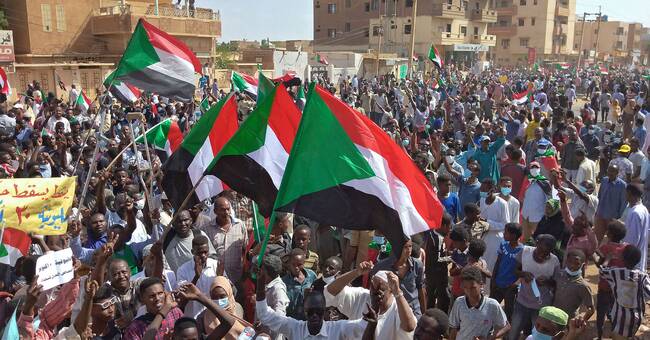The Sudanese Medical Association reports that two people were shot dead during the protests.
One of the victims was shot in the head and the other victim in the stomach, according to the organization.
The death squads of the security forces are reported to have taken place in the twin city of Karthum, the capital Omdurman, where the protests began on Saturday.
Prior to the protests, both the UN and the United States had called on the coup plotters to avoid confrontation.
The march in Omdurman began after democracy activists urged the people to mass protests against Monday's military coup.
- We will not let ourselves be controlled by the military.
That is our message, said human rights activist Tahani Abbas, before the demonstrations begin.
The UN has met with coup plotters
The protest movement hopes for hundreds of thousands of participants in the demonstrations against Monday's coup and the violence perpetrated by the coup plotters.
Security forces have repulsed previous protests against the coup with sharp ammunition and tear gas and even before Saturday's demonstrations, there was information that nearly 30 deaths have been claimed so far.
The UN Special Envoy to Sudan, Volker Perthers, met on Friday with one of the leading generals in the coup.
After the meeting, he wrote on Twitter that he emphasized the need for calm and that the coup plotters must allow peaceful protests.
He added in a separate statement that the UN mission in Sudan is actively coordinating mediation efforts to bring about a dialogue.
Prime Minister under house arrest
The coup in Sudan - when Prime Minister Abdalla Hamdok and other leading politicians were arrested or placed under house arrest - was led by General Abdel Fattah al-Burhan.
According to the coup plotters' plan, Sudan will be led by the military and a technocrat government until democratic elections are held in the summer of 2023.
As recently as 2019, widespread protests led to the overthrow of Sudan's hardline President Omar al-Bashir after 30 years in power.
A transitional government was then set up under a governing council, chaired by General al-Burhan.
In the coup, the military seized Sudan's state television and radio channels.
At the same time, major roads were blocked, while the internet was blocked for many Sudanese.
Shortly after the coup, General al-Burhan declared live that there was a state of emergency in the country and that both the government and the governing council had been dissolved to "correct the direction of the revolution".

